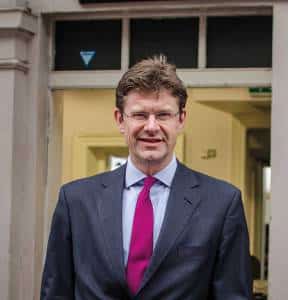Various points of view will be expressed between now and the vote on June 23 on whether to leave Europe and this newspaper will do its best to reflect a cross section of opinions so that readers can make an informed judgment on arguments from local people. We start with the opposing positions of our two Conservative MPs…

in 2005. He is Secretary of State for Communities and Local Government
In the General Election campaign last year I stood on a manifesto that promised that everyone in Britain should have the chance to decide whether we should remain part of the European Union in a clear in/out referendum.
At the time, many people didn’t believe that was a promise that would be kept. So I am proud that, less than a year after winning a majority in Parliament, we are delivering on that promise – with the referendum taking place on June 23.
My vote in the referendum counts the same as everyone else’s in Tunbridge Wells – no more, no less. And that’s how it should be. In our area there will be people who want to remain in the EU, people who will campaign to leave, and others who will – perfectly reasonably – prefer to keep their decision to themselves.
I will be casting my vote in favour of Britain remaining part of the European Union. I believe that we have a brighter future as a leading part of Europe than out of it. For me, it comes down to our national interest. We are a trading nation. Nearly half of all our exports go to countries in the European Union – the biggest free-trade zone in the world. Our jobs and our livelihoods depend on businesses large and small selling their wares to other countries.
If we left the EU, we would be left outside the European single market. We would have to try to negotiate a way for our businesses to access their customers across Europe. With no say in setting them, the rules of the market would be used to favour EU members at the expense of British firms and British jobs. I think it’s far better for Britain to help make the rules rather than have to follow the rules set by others – our competitors.
For us here in Tunbridge Wells, I believe we have benefited particularly from this engagement with Europe. Many of our local employers operate across Europe. The head of Axa – the biggest private sector employer in Tunbridge Wells – said that Britain leaving the EU would ‘deter investment, threaten jobs and put the economy at risk’. And many of my constituents earn their living in London – the most successful city in Europe, whose strength depends on it being the commercial capital of Europe.
Some readers of this column – including many good friends – will take a different view. That is a healthy reflection of our freedom and democracy and I have respect for those who come to a different conclusion. That is why it was right for the Government to give everyone a direct say, not just MPs.
I hope the debate over the next few months will be spirited, serious and respectful – recognising the fact that each person’s vote counts equally.
Whatever we decide on June 23, our future ultimately depends on the strength of our democracy, the soundness of our economy and the unity of our nation.

I do of course understand those who argue that membership is about selling more goods and services, accessing markets and completing deals.
You will hear much of this argument in the debate to come and my view is that, if we are honest, it’s impossible to prove either way.
Will we be able to negotiate a better trading relationship outside the EU given how badly Europe needs our business? I believe so, but I can’t prove it empirically.
Will we be subject to less bureaucracy and greater freedom to decide how to run our economy? I can’t imagine otherwise.
Will we contribute less to the EU budget if we aren’t members, and will we be able to reallocate money to our priorities rather than ones set in Brussels? I’d like to understand why that wouldn’t be the case.
However, this is not the way in which I personally believe our continued membership of the EU should be decided.
While the Prime Minister almost certainly got the best deal available, I am not going to pretend I haven’t been disappointed at every stage by what Europe’s leaders were prepared to give.
For me, the overriding issue is, and always has been, the question of legitimacy.
Or to put it another way, do the decisions made in Brussels command the support of the British people? I’m afraid the answer post-renegotiation is an emphatic no.
Take immigration. Now I am no little Englander, I am the product of immigration and proud of it.
We are a global trading nation, and I passionately believe that we have to be open to immigration to continue to be successful.
But to be able to be open to the world our people need to know that we are in control of our borders.
People need to know that our immigration policy is legitimately decided by their elected representatives, not some faceless unaccountable body in a foreign town.
Or take the right to veto EU laws that are not in our national interest. Brussels has offered up the prospect that we will in future be able to block new EU laws if we persuade another 15 countries’ parliaments to join us.
This is a long way from where we were before the Lisbon Treaty and with it the removal of Britain’s sole right of veto in up to 60 policy areas that have nothing to do with trading in the single market.
The growing constraint on Britain to decide its own approach to issues such as prisons and policing is a dagger at the heart of sovereignty and a huge blow to the legitimacy of our Parliament.
The truth is the EU has faced a massive crisis of legitimacy of its own for many years. And it’s a crisis that could envelope us all.
Forget the fear of leaving. For me the real fear is remaining in a club whose members devise rules to constrain others and toss them away when it suits them, leading to chaos and disorder.
These questions go to the heart of the decision I have made to vote for the UK to leave the European Union.








